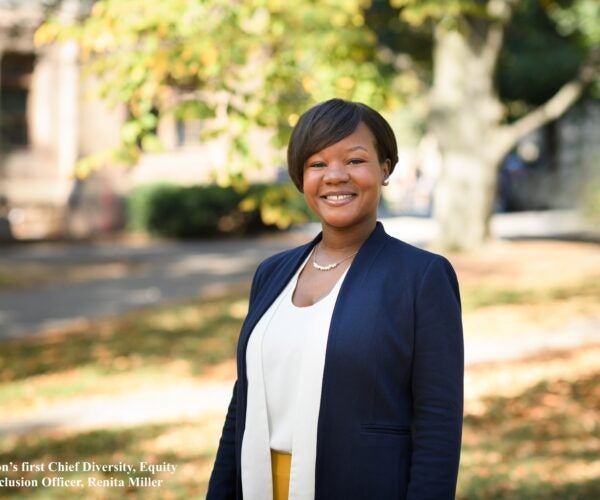What do high school students think about the diversity, equity and inclusion movement in business and society? Responses to a Wharton Global Youth podcast on racial justice are a telling snapshot of student perspectives. Commenter Caroline G., a high school senior from California, says, “While racism and discrimination are not things that will disappear once we acknowledge them, it is also important to realize that we have the resources to combat and alleviate these problems.”
In the business world, that work is often taken up by Chief Diversity Officers, executives who are championing and advancing DEI in the workplace and among all stakeholders. That purpose has taken on greater meaning as companies grow ever-more sensitive to Environmental, Social & Governance (ESG) factors that reflect societal values and influence every aspect of business. According to LinkedIn’s 2022 Jobs on the Rise report, Diversity and Inclusion Manager is among the fastest-growing job titles in the U.S., as more professionals lead teams of people who are supporting company initiatives related to increasing diversity, equity and belonging.
Everybody Onboard
The Wharton School of the University of Pennsylvania’s commitment to effective DEI practices, led by Erika James, Wharton’s first woman and African American dean, took a leap forward in October 2022, when the school welcomed Renita Miller as its inaugural Chief Diversity, Equity & Inclusion Officer. The mission: to solidify a culture of dignity, respect and transparency through the appreciation of differences.
Dr. Miller is taking an approach that she describes as part strategy and part relationship-building. “When you’re doing this work, everybody has to be involved,” says Miller, who previously served as associate dean for access, diversity & inclusion at the Graduate School of Princeton University. “I need to be able to partner and collaborate with people who are invested in the work, but also to support the organization and help us move forward. I have a lot of meetings with people who are in different areas of the Wharton ecosystem: faculty, staff, students, alumni. I spend time understanding the challenges and the opportunities for Wharton in the space of DEI.”
One of Dr. Miller’s first big projects is a collaboration between her office, Penn Medicine and Wharton’s Coalition for Equity and Opportunity (CEO) to organize a Juneteenth Wellness Summit. “I am learning that there is an opportunity for Wharton to lead as it relates to engaging with the surrounding West Philadelphia community,” notes Miller. “That’s super meaningful for me because I really believe in the impact that service has, not just on the individual, but for the communities we’re serving. It’s not just about strategizing; it’s about the “doing” part of advancing equity.”
Natalie Edwards (WG’18) couldn’t agree more with the sentiment of putting ideas into motion. As the global chief diversity officer of National Grid, one of the world’s largest utility companies serving the U.S. and the U.K., she believes that corporations need to act on their stated commitment to diversity. While many executive chief diversity officer positions were created after George Floyd’s death in 2020, some of those positions are now reportedly being eliminated, or CDOs are choosing to leave.
Edwards suggests that this “unfortunate trend” could be a sign companies aren’t serious about implementing DEI strategies, or that CDOs are feeling unsupported in their roles. Whatever the case, the work, she says, requires perseverance and pervasive buy-in.
“It’s deeply rewarding work, but it can be challenging to build and maintain a corporate culture that encourages employees to listen, learn, and drive DEI — all while real barriers and biases continue to exist in our society,” says Edwards, who partners with colleagues across National Grid — from the CEO to interns — to keep DEI and global diversity at the center of the business.
“I’m very grateful that I’m completely supported in the work I do at National Grid,” she adds. “I lead a team dedicated to sustaining a diverse, equitable, and inclusive corporate culture. We set standards that ensure our workforce reflects the communities we serve at all levels, enable diverse colleagues to advance in their careers and secure leadership roles, and empower our Employee Resource Groups (ERGs), which provide supportive spaces for networking, peer mentoring, and engagement with senior leadership.” National Grid has 16 ERGs, including networks for women, people with disabilities, veterans and LGBTQ+ colleagues.
“Building relationships is key to this work. You can’t do it alone. You have to be able to bring people along with you.” –Renita Miller, Chief Diversity, Equity & Inclusion Officer, the Wharton School
While there may be some re-aligning among CDO positions, the trend toward enriched DEI in the workplace is powerful, notes Dr. Miller. She points out that companies are embracing the research, which shows, among other things, that companies with boardroom diversity — including women and underrepresented minorities — are more profitable. “DEI is changing in positive ways because organizations and businesses are understanding the value of having different voices in the room,” she says. “It is becoming part of the value system. Younger people going into business want to be in organizations that are diverse. They want to be able to learn and grow from others who are from different backgrounds.” Wharton’s Leading Diversity at Work podcast series offers an exploration into all aspects of DEI in business.
Starting in fall 2023, undergraduate and MBA students at Wharton will be able for the first time to pursue concentrations and majors in DEI. Corinne Low, assistant professor of business economics and public policy in Wharton’s management department, which will administer the DEI-focused degrees, has said, “We can’t wait for the first students to graduate with the official DEI major in 2025, and continue to lead in helping companies become more diverse, equal, inclusive, and, thus ultimately, competitive on the global stage.”
‘Driven to Lead Social Change’
Dr. Miller suggests that high school students aspiring to get into DEI-related work must be deeply curious and equally collaborative. “Building relationships is key to this work. You can’t do it alone. You have to be able to bring people along with you,” she stresses. Experiencing how corporate culture operates is also essential. She credits Inroads, a nonprofit that creates career pathways for diverse high school and college students – often through internships — for changing the trajectory of her life.
Edwards recommends refining your communication and analytical skills and understanding the nuances of human resources. “If you’re interested in the DEI field, you’re probably a problem solver who’s driven to lead social change and find better solutions to long-standing challenges,” she says, adding that she focused her Wharton studies on business analytics, or the use of data analysis to inform decision-making.
Numbers tell the story of progress or lack thereof in an organization, which underscores the need to be data-informed. For example, Boston Consulting Group (BCG) recently launched a more robust DEI dashboard for its company leaders to hold themselves accountable for progress. This type of interface provides a visual representation of company diversity, equity and inclusion practices and outcomes by representing the data through graphs and charts that can be read at a glance.
“To do DEI work well, you need to be able to articulate goals and strategically analyze processes and procedures. Part of this work is about pitching ideas and getting buy-in,” adds Dr. Miller. “I love for people to feel seen and valued. But I also love when the numbers tell me that what I’m doing is working. You want to know that your efforts matter.”
“Examine your current environment and consider what you can do to make it more diverse and inclusive of all people. Prioritize DEI in your daily life.” –Natalie Edwards, CDO, National Grid
Both Dr. Miller and Edwards highlight that each day of their jobs can look very different, demanding them to stay flexible and hold fast to the tenets of their work: celebrating degrees of difference; amplifying fairness and justice; and nurturing a culture that ensures all stakeholders, from students to alumni, employees to customers, feel seen valued and respected.
“DEI is always changing,” observes Edwards, who was the only student in her MBA class to start a job in DEI immediately after graduation, taking a role at Estée Lauder in New York City. There, she supported creating products for different skin tones, hair types and gender identities. The DEI mindset at National Grid includes bringing clean energy, jobs and economic development to communities that are underrepresented and disproportionately impacted by climate change. “Knowing that there are new areas to influence and improve is really motivating and keeps me on my toes,” she continues. “My best advice is to start where you are, like I did. Examine your current environment and consider what you can do to make it more diverse and inclusive of all people. Prioritize DEI in your daily life.”
DEI, concludes Dr. Miller, is not just the responsibility of the executive CDO. Awareness
alone is empowering – and can lead to action. “Opportunities to make a positive impact are not related to a specific role. DEI work is everywhere and in everything,” she says. “Stay curious, ask questions, and know that you can make a difference wherever you are planted…whether that is at school, a summer job, or in your community. Your voice matters.”
Conversation Starters
Dr. Renita Miller says, “Younger people going into business want to be in organizations that are diverse.” Do you agree with this statement? If so, why is this a core value of your generation?
Have you had an experience working to promote diversity, equity and inclusion in your school, community or elsewhere? Please share your story in the comment section of this article.
What are 5 skills that are important to build if you want to advance DEI in the workplace? Why, in particular, is analytics essential?




